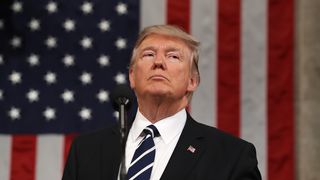Americans were alarmed last week when their president suggested on Twitter that the November 3 presidential election should be delayed because mail-in ballots would be fraudulent.
With Universal Mail-In Voting (not Absentee Voting, which is good), 2020 will be the most INACCURATE & FRAUDULENT Election in history. It will be a great embarrassment to the USA. Delay the Election until people can properly, securely and safely vote???
— Donald J. Trump (@realDonaldTrump) July 30, 2020
The president has no authority to change the date of an election. The US Constitution gives that power to Congress alone, and Republicans in Congress, including Senate leader Mitch McConnell, quickly dismissed any possibility of delay.
Trump’s tweet nonetheless caused widespread dismay. Much of it came from conservatives who usually defend him. Editors of conservative journal National Review called it:
[…] an incendiary and absurd idea unworthy of being spoken — or even thought — by a president of the United States.
Federalist Society founder Steven Calabresi condemned Trump’s tweet as “fascistic” and wrote it was “grounds for the president’s immediate impeachment”. Not even Fox News entertained the idea.
But the real danger here isn’t the possibility that Trump would delay the election, which his own allies won’t allow. It is his campaign to delegitimise the election in advance.
Trump has long made baseless complaints about voter fraud to cast doubt on election results. Throughout 2016 as he trailed Hillary Clinton in the polls, he repeatedly said the election would be “rigged”. Even after he won in the electoral college, he insisted he also would have won the popular vote but for “millions of people who voted illegally”.
Both Republican and Democratic states have moved to expand access to mail voting. Trump has responded with completely unsupported assertions that foreign government could forge mail ballots en masse.
Unlike his ideas about delaying the election, Trump’s claims about widespread voter fraud have significant traction on the right. For years conservative activists have used vastly exaggerated claims about voter fraud to justify measures that suppress minority turnout.
With his standing in the polls again precarious, mail-in ballots have become the latest targets of Trump’s obsession with “fraudulent” voting, despite the fact he and 15 other members of his White House staff have recently voted by mail.
Two-thirds of voters support increased availability of mail voting to ensure safety during the pandemic. Both Republican and Democratic states have moved to expand access to mail voting. Trump has responded with completely unsupported assertions that foreign government could forge mail ballots en masse.
A genuine problem is that a greatly increased volume of mail ballots could overwhelm the postal service. This already happened in the primaries. In some states large numbers of votes had to be discarded because they arrived after the election.
There are currently endemic delays in the United States Postal Service resulting from cost-cutting measures introduced last month by new Postmaster General Louis DeJoy, a Trump fundraiser. These measures are supposed to deal with a longstanding “financial crisis” in the USPS.
This crisis is itself a political creation. It has its origin in punitive legislation from 2006 forcing the USPS to fully fund its pensions 75 years in advance. No other business in America faces this requirement.
The day after Trump’s “delay the election?” tweet he had another tweet that got less blowback but was nearly as ominous.
Must know Election results on the night of the Election, not days, months, or even years later!
— Donald J. Trump (@realDonaldTrump) July 30, 2020
If this year’s primaries are any guide there is every chance election results will not be known for days, especially if the vote is close.
While some states like Colorado developed fast and efficient systems for processing mail ballots, in other states, including Michigan, Wisconsin and Pennsylvania, outdated technology and legislation hamper the count.
Usually, the expansion of mail voting does not affect either party’s share of the turnout or vote. But Trump’s campaign against mail voting may create serious partisan imbalances in modes of voting as Republicans refuse mail ballots on principle. If mail voting leans Democratic while in-person voting leans Republican, election night results in some states could change significantly as mail ballots are counted for days afterwards.
Some commentators fear Trump will declare victory based on early results, then claim the election is being stolen by “fraudulent” mail ballots.
It is not encouraging that Trump has refused to commit to accepting the election results and that Attorney-General William Barr has been equivocal.
But other commentators, noting his long record of unfulfilled threats, say Trump is unlikely to try to “steal” the election by refusing to leave office (as Joe Biden suggested he might). While Trump’s Republican allies have generally stuck with him throughout his numerous assaults on democratic norms, their reactions to his “delay” tweet show there are limits to what they will tolerate when it comes to attacks on the peaceful transition of power.
If Trump loses narrowly, the problem may not be removing him from office. It may be a further deepening of political polarisation in the United States. There have been partisan attacks on the legitimacy of the last four presidents. Trump could become a new “lost cause” figure whose supporters never accept his defeat and whose “betrayal” accelerates right-wing radicalism in the Republican Party.
Biden has a good chance of winning the election, but his chances of restoring “normality” are a lot worse.






